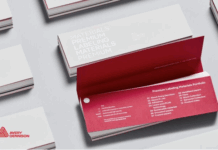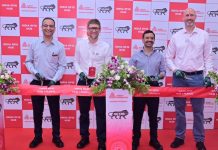Avery Dennison recently joined hands with the Association of Label Printers (ALPS) and Shakti Plastic Industries, one of the leading plastic recyclers in India, to re-purpose label waste. The Matrix Recycling Programme enables label converters and end-users to co process or reprocess the leftover label matrix instead of disposing it in landfills. At no cost, it is processed by the program as long as the waste matrix is sorted by the material used at the converter’s end.
The label matrix is the leftover material after diecutting the labels. For pressure-sensitive labels, the remaining material comprises all the components of the original material, including silicone-coated liner, adhesive, and face stock, whether it is of paper or a flexible film. Through what is being described as co-processing, the paper matrix can be reused as fuel in industrial processes, while through reprocessing, the film-based face stock of the matrix is converted to polymer pellets used for manufacturing boards or benches.
Avery Dennison’s liner recycling developments
Started over a year ago, Avery Dennison’s liner recycling activity began with one recycler at a single location, which has now grown and expanded to a pan India presence with
the addition of several more recycling companies. The activity entails creating awareness among the converters by the end-users and the recyclers to encourage them to sort and
send their liner waste to the recyclers. According to Parag Bagade, head of Sustainability, Compliance, and ADvantage Services for Avery Dennison’s South Asia Pacific and SubSaharan African region, the liner material is de-siliconized and re-pulped, which can be used for making tissue paper or printing paper.
Through the Avery Dennison liner recycling activity, label converters are paid for the liner waste that they supply to the appointed recyclers. According to Bagade, though there are several variables, there is no cost for joining the program. The biggest challenge for Avery Dennison, according to Bagade, was to find the right recycling technology than in finding the partners for the program. Converting liner, which contains a silicone coating to pulp, involves a different chemistry altogether. “It took time for us to crack this technology. Now, we’ve cracked it, but the expansion through awareness and education is the key to any significant recycling activity. All in all, plastics aren’t the demon; our approach and attitude towards plastics is the elephant in the room. And trust me, this practice is easier said than done,” said Bagade.
Gururaj Ballarwad, president of ALPS, said, “Our role will be to facilitate our members or non-members by motivating and encouraging them (the label converters) to segregate the matrix material and send it to the recycling location. We’re proud to collaborate with Avery Dennison to reach the right audience with a solution that’s good for our industry, the environment and communities.” Bagade added, “This program is mainly to help the pressure-sensitive label industry. With new regulations coming in, all the converters have to be extremely cautious in managing their label waste. With regulations such as Extended Producer Responsibility (EPR), including the management of recyclables and non recyclables, if managing the label waste becomes a bottleneck, the pressuresensitive industry will have nowhere to go. Secondly, we intend to make sure that no waste or minimal waste goes to landfill. We have to ensure that the issue at hand is addressed sustainably, and we protect our environment.”
Initiative for all labelstocks
To add to this, Bagade clarified that the effort is not limited only to Avery Dennison label stock. With this initiative, the company will procure the matrix waste of label stock of any manufacturer. “As I said, this is a measure that we’ve taken for the greater good of all of us. When we decided to address this issue of waste, we didn’t say that it should be limited to us only. The focus is the waste from the industry, not the waste from Avery Dennison related label converters only,” shared Bagade.










